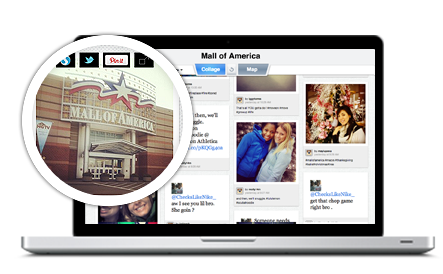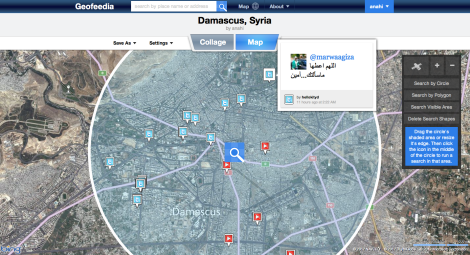It seems so innocent: You’ve just shot the cutest pic on Instagram, applied then necessary filters and tacked on a clever caption. All that’s left is to check and uncheck boxes – share to Facebook? Share to Twitter? Allow geo-tagging? When you bounce back and forth between Rome, New York, Chicago and a handful of other locations in the course of a year like I am, geo-tagging feels like the thing to do either for posterity or a convenient chance to brag. And it doesn’t seem dangerous, does it? Chicago’s a big city, after all. What do I care if someone knows that I took a picture somewhere within it?
The problem is that with the right program people don’t just know that I took a picture in Chicago, they know exactly where I was standing – right down to the precise coordinate. Geofeedia is a prime example of this. With a paid account, customers have the ability to track geo-tagged Twitter, Instagram, Flickr, Youtube and Picasa content back to its exact location (“Features,” 2012).
At the time of its release in May of last year, the program was solely location based, a flaw pointed out by Patrick Meier, Director of Social Innovation at the Qatar Foundation’s Computing Research Institute. Still, he praised Geofeedia for its crisis-mapping potential. “Geofeedia has a lot of potential vis-a-vis humanitarian applications,” he said in a blog post (Meier, 2012). Since then, Geofeedia CEO Phil Harris has built in a number of features to improve searchability. Now, users can filter media by keyword, time frame, author and media type, increasing its usefulness in the humanitarian realm. It is also a useful tool for journalists looking location-based quotes and media for both news and trend stories. Now more than ever, as the internet closes the gap between journalists and tragedies across the globe, social media has become an indispensable tool. As in Egypt, Libya and other countries involved in the Arab Spring uprisings of 2011, Twitter became an important source in both activist movements and reports about them (Ruth, 2012).
But what about all of the non-journalists who have access to this technology? By allowing customers to search by author, Geofeedia opens up the potential for stalking and other felonies. If a customer with the intent to rob sees that a person has made a post outside of their home, they will see this as an opportunity to break into the author’s home. If a customer is looking to stalk a particular person, it would be all too easy to track their location. The issue here is that people are unaware of such dangers. Because knowledge of this program and others like it are not so widespread, few people think twice before geo-tagging. The fear of the internet that was instilled in us as children, back when the internet was viewed as a dangerous place full of strangers rather than a way of connecting to friends, is gone now. People are much less cautious in their actions in every aspect except getting a career – crop out the Solo cups and everything else is smooth sailing. They need to be re-educated in the way of safe internet use to adapt to constantly developing technology.
This issue here isn’t really about the usefulness of programs like Geofeedia. The technology is highly effective and useful in a professional context, whether that mean marketing or journalism or another business-related venture. But, as with all new media and technology, the mainstream user needs to be on guard to protect from those who will use it with malicious intent. It is their responsibility to be cognizant and they will be the ones who suffer if they aren’t.
Citations:
Features. (2012). Retrieved from http://corp.geofeedia.com/company/features/
Meier, P. (2012, June 3). [Web log message]. Retrieved from http://irevolution.net/2012/06/03/geofeedia-for-crisis-mapping/
Ruth, D. (2012). Social media and the internet allowed young arab women to play a central role in the arab spring uprisings, new rice study says. Rice University News & Media, Retrieved from http://news.rice.edu/2012/05/22/social-media-and-the-internet-allowed-young-arab-women-to-play-a-central-role-in-the-arab-spring-uprisings-new-rice-study-says/

